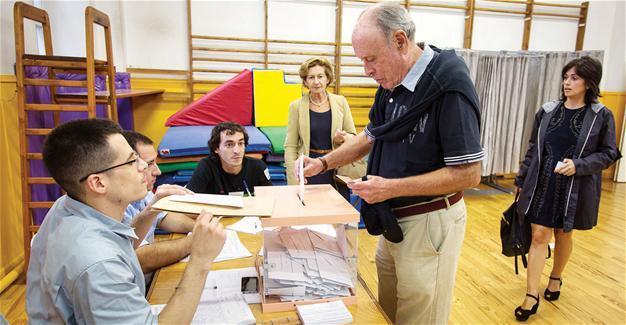Spain’s regional elections boost acting PM’s party, weaken Socialists
SAN SEBASTIAN, Spain

AFP Photo
Regional elections in Spain on Sept. 25 strengthened acting Prime Minister’s Mariano Rajoy’s conservatives and weakened the Socialists, under pressure to let him form a government and end a months-long political impasse, AFP reported.
The country is being run by a government without full powers after inconclusive elections in December 2015 and June that saw Rajoy’s conservative Popular Party (PP) win without an absolute majority and other parties fail to forge a rival coalition.
The polls in the northern regions of Galicia and the Basque Country have thus been seen as a possible game-changer, reflecting the public mood as an Oct. 31 deadline looms.
If no government emerges by then Spain, the eurozone’s fourth largest economy, will face an unprecedented third election around Christmas.
The PP renewed its absolute majority in Rajoy’s rainy northwestern home region of Galicia, a long-time party stronghold.
And the party lost just one seat in the independence-minded Basque Country where its strong defense of a united Spain has never been popular.
Rajoy’s party won 41 out of 75 seats in the regional parliament in Galicia - equal to its share in the outgoing assembly - with over 95 percent of ballots counted.
In the verdant Basque country in northern Spain, the PP came in fifth with nine seats in the 75-seat assembly, down from 10 seats in the outgoing assembly, after 99 percent of the ballots had been counted.
The moderate nationalist PNV party was once again the most-supported party in the Basque region as expected, winning 28 seats, but without an absolute majority.
In both regions, the Socialist party (PSOE) lost seats from previous elections four years ago and lost votes to new anti-austerity party Podemos, which is seeking to replace it as Spain’s main party on the left.
The PSOE finished fourth in the Basque region, behind Podemos, and was tied in Galicia with the En Marea coalition which includes Podemos with 14 seats each.
“These results are not good for the Socialist party,” said Cesar Luena, one of the most senior officials in the formation.
“It is a negative result in both regions,” he added.
The Socialists’ poor showing follows bad results in December’s general election and again in the June repeat vote.
It is expected to increase pressure on Socialist leader Pedro Sanchez to allow Rajoy to form a new government at national level.
Sanchez had voted against a Rajoy-led government in a parliamentary vote of confidence earlier this month. He is seeking to negotiate a leftwing coalition alternative with arch-rival Podemos.
But a weak result could wreck this strategy, either forcing Sanchez out or pressuring him into allowing the rightwing coalition government through by abstaining in another vote of confidence.
